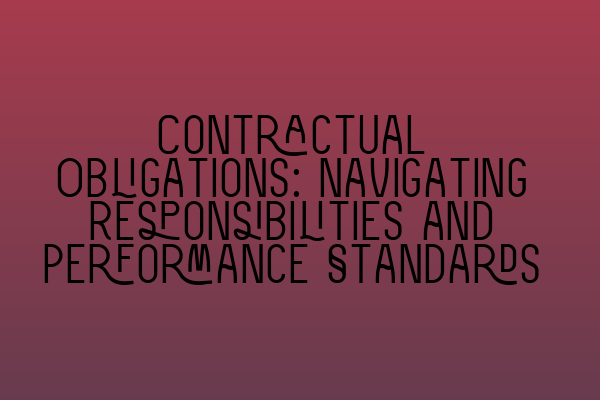Contractual Obligations: Navigating Responsibilities and Performance Standards
Contracts are the foundation of any business relationship. Whether you are a small business owner, an independent contractor, or a large corporation, understanding contractual obligations is essential for ensuring smooth operations and avoiding potential disputes. In this article, we will explore the importance of contractual obligations and provide tips on how to navigate responsibilities and performance standards effectively.
What are Contractual Obligations?
Contractual obligations are legally binding agreements between two or more parties that outline the responsibilities and performance standards each party must fulfill. These obligations can range from specific tasks or deliverables to payment terms and confidentiality requirements. Failure to meet these obligations can result in lawsuits, financial penalties, or damage to your professional reputation.
It is crucial to draft contracts with clear and unambiguous language to ensure all parties involved have a clear understanding of their obligations. This includes defining the scope of work, timelines, quality standards, and any contingencies in case of changes or unforeseen events.
Navigating Responsibilities
When entering into a contract, it is essential to thoroughly understand your responsibilities and the expectations of the other party. Here are some tips to help you navigate your contractual responsibilities:
- Read the Contract: Before signing any contract, carefully review and understand all the terms and conditions. Pay close attention to your duties, deadlines, and any special requirements stipulated in the agreement.
- Identify Key Deliverables: Clearly identify the deliverables or services you are expected to provide. Break down complex tasks into manageable milestones to ensure progress is trackable and measurable.
- Communicate Proactively: Establish open lines of communication with the other party to discuss any potential issues or concerns. Regularly update them on your progress and seek clarification if necessary.
- Document Everything: Keep detailed records of your work, communications, and any changes or modifications to the contract. This documentation will help protect your interests and provide evidence in case of future disputes.
- Seek Legal Advice: If you are unsure about your contractual obligations or find yourself facing a potential breach, consult with a qualified contract law solicitor. They can provide expert guidance and help you navigate any legal challenges.
By following these steps, you can fulfill your contractual responsibilities effectively, minimize the risk of disputes, and maintain a strong professional relationship with the other party.
Performance Standards
Meeting performance standards is essential for the successful completion of any contract. These standards may include quality benchmarks, timelines, and other measurable criteria agreed upon by both parties. Here are some tips to help you meet and exceed performance standards:
- Understand the Expectations: Familiarize yourself with the performance standards outlined in the contract. If necessary, seek clarification from the other party to ensure a shared understanding of what is expected.
- Create a Plan: Develop a detailed plan that outlines how you will meet the performance standards. This may include setting milestones, allocating resources, and monitoring progress regularly.
- Manage Risks: Identify potential risks or obstacles that may affect your ability to meet the performance standards. Develop contingency plans and communicate any potential delays or issues with the other party as soon as possible.
- Maintain Quality: Focus on delivering quality work that meets or exceeds the agreed-upon standards. Regularly review and evaluate your progress to ensure you are on track.
- Continual Improvement: Strive for continuous improvement by learning from your experiences and feedback. Use this knowledge to refine your processes and enhance your performance in future contracts.
By consistently meeting performance standards, you demonstrate professionalism, build trust with the other party, and increase the likelihood of future opportunities for collaboration.
Contracts play a vital role in business operations, and understanding your contractual obligations is crucial for success. Navigating responsibilities and meeting performance standards require careful attention to detail, effective communication, and a proactive approach. By following the tips outlined in this article and seeking professional guidance when needed, you can minimize risks, foster positive business relationships, and achieve excellent results.
For further information on preparing for SQE exams or to access practice exams and courses, check out the following related articles:
